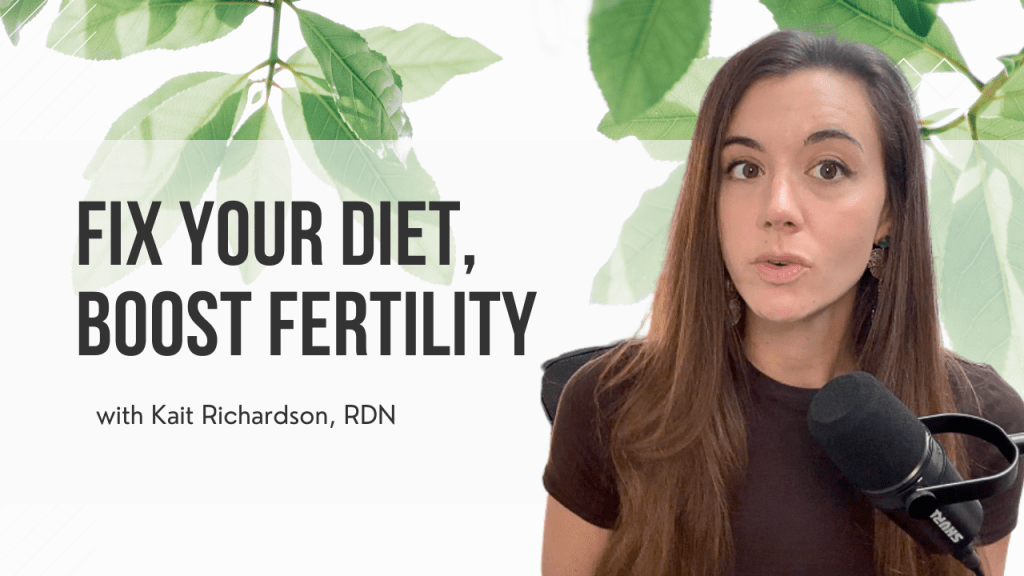Expert tips from an Orlando Fertility Dietitian to balance hormones, fuel your body, and optimize your fertility.
Remember in high school when our health teachers made it sound like you’d get pregnant just by hugging a boy (so long as you didn’t “leave room for Jesus”?)
Welp, that was a load of garbage.
Turns out, making a baby can actually be extremely difficult, time-consuming, and utterly heartbreaking. Especially when you’ve been trying for months and still, nothing.
But here’s something to consider: what if some of your everyday habits could be quietly sabotaging your fertility?
Think of it this way: fertility is all about balance of energy, hormones, and overall well-being.
As an Orlando Fertility Dietitian, I help women trying to concieve find that balance. Together, we focus how to nourish the body for regular ovulation, improved egg quality, and building the foundation needed to support pregnancy. (Ready to move beyond the guesswork? Let’s connect.)
Here are 5 key habits that can impact fertility, plus actionable tips to support your body naturally.
1. How Much You Exercise Matters
Exercise is amazing for your body, mind, and hormones! But, too much or too little can be a fertility roadblock.
-
- Too much: High-intensity workouts, long runs, or daily HIIT can lower estrogen and progesterone, disrupting ovulation.
-
- Too little: Sedentary habits may contribute to insulin resistance, inflammation, and hormone imbalance.
The sweet spot: I know, this may sting if you’re an endorphin addict, but I recommend moderate, consistent movement over anything high intensity. Think brisk walking, strength training, yoga, or low-impact cardio. This keeps your hormones happy without overstressing your body.
Love your Orange Theory classes or HIIT too much to let it go completely? Limit these workouts to 1-2x a week, and try to avoid going too hard during your luteal phase. Remember, these workouts will always be here. Right now, your priority should be your fertility.
2. How Much You Eat Can Make a Difference
Your body needs the right fuel to ovulate consistently. Skimping or overeating can both interfere with fertility:
-
- Eating too little: Low energy availability disrupts hormone production and can impair ovulation.
-
- Eating too much ultra-processed food: May worsen insulin resistance and inflammation, which are linked to fertility challenges. Ultra-processed foods include pre-packaged snack foods (think chips, cookies), fast food, sugary cereals or granola bars, and even protein bars that are full of artificial junk.
The fix: Don’t skip meals! Aim for consistent, balanced meals and snacks that provide key nutrients like iron, folate, protein, and omega-3s. I tell my fertility patients to consume 80% whole real foods- plants, lean meats, herbs, and dietary fats like avocado and olives.
Working with a fertility dietitian at Nutrition Awareness can help you figure out how to put these ingredients together in the right portion for YOU. Book your initial consultation here!
If you love sweets, make them yourself! Use anti-inflammatory ingredients like cacao nibs, cinnamon, berries, and almond flour in place of traditional sugar or enriched white flour.
Your body will thank you (and so will your future baby)!
3. Fats Are Not the Enemy
Hormones are made from cholesterol, so dietary fat is essential for reproductive health. But quality and quantity matter:
-
- Too little fat: Very low-fat diets can suppress ovulation and menstrual cycles. For reference, the average woman needs between 25-35% of her total calories from fat. If you’re eating an average of 1800 calories per day, you need at least 50 grams of fat.
-
- Unhealthy fats: Fried foods and highly processed fats may increase inflammation, which is not ideal for fertility.
-
- Healthy fats: Olive oil, avocado, nuts, seeds, and fatty fish can improve egg quality and support implantation.
The key: Focus on balance and quality. Don’t cut fat too low, and choose nourishing sources. A good place to start is aiming for at least 10g of dietary fat per meal, but you may need more.
4. Conflicting Goals: Weight Loss vs. Fertility
Many women feel stuck between wanting to lose weight and wanting to conceive. Here’s the reality:
-
- Aggressive dieting: Rapid weight loss can harm ovulation, lower hormone levels, and stress your body.
-
- Excess weight: Increases risk of insulin resistance, PCOS-related ovulation issues, and pregnancy complications.
The takeaway: I can’t stress enough how important it is to shift your priority from weight loss to nourishing your body for conception. Adequate nutrition and energy are key for fertility. You have the rest of your life to lose weight, let’s focus on what matters now.
That being said, we know having a healthy body weight can be beneficial for women trying to conceive. If you are concerned about your weight impacting your fertility, focus on creating a mild to moderate caloric deficit with your Orlando fertility dietitian and women’s health nutritionist. Together, you can ensure you’re getting the right amount of food to support your goals.

5. Stress Can Sneakily Affect Hormones
Chronic stress raises cortisol, which can interfere with reproductive hormones and ovulation. High stress can also impact sleep, libido, and lifestyle choices… like skipping meals or over/under-exercising!!!
Stress isn’t the sole cause of infertility, but managing it can improve hormone balance and cycle regularity. Try mindfulness, rest, therapy, or relaxation practices to support your body’s natural rhythms.
Fertility Is About Balance
The bottom line: fertility thrives on energy balance, hormone stability, and overall well-being. Too much or too little exercise, food, fat, stress, or restrictive dieting can throw your body off. By making small, intentional changes in these areas, you can create the best environment for ovulation, conception, and a healthy pregnancy.
If you’re ready to take control of your fertility without the overwhelm, we help women like you create custom nutrition strategies, lifestyle tweaks, and stress-management plans to optimize reproductive health. Whether you’re looking for guidance from a fertility dietitian or insights from a women’s health speaker in Orlando, I’ve got you covered.
